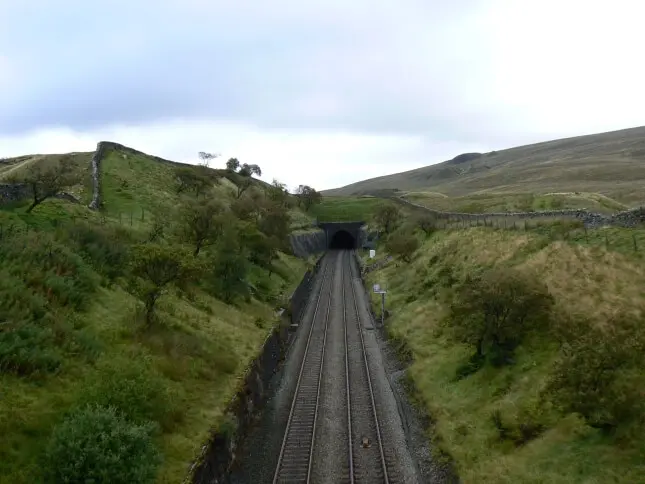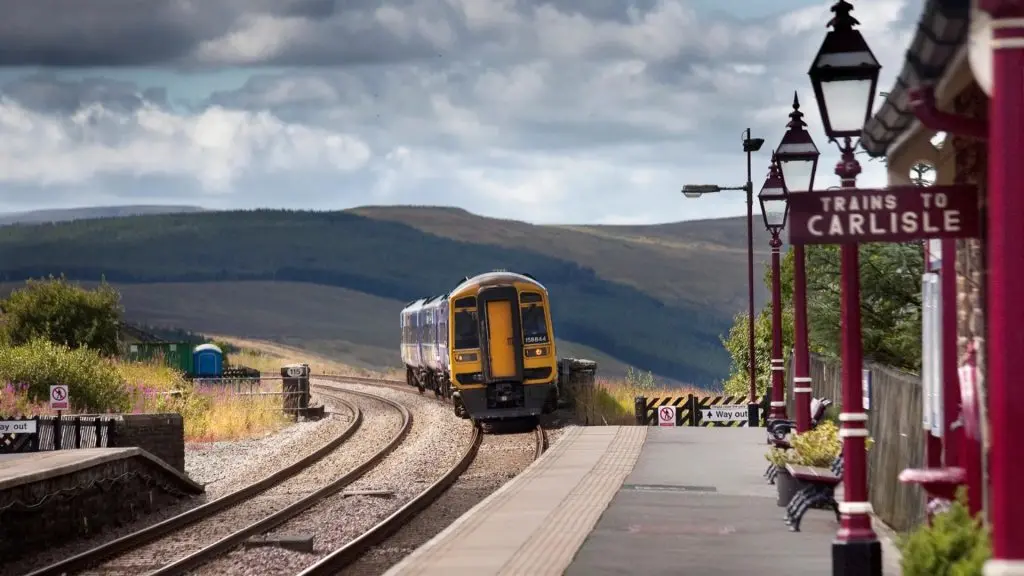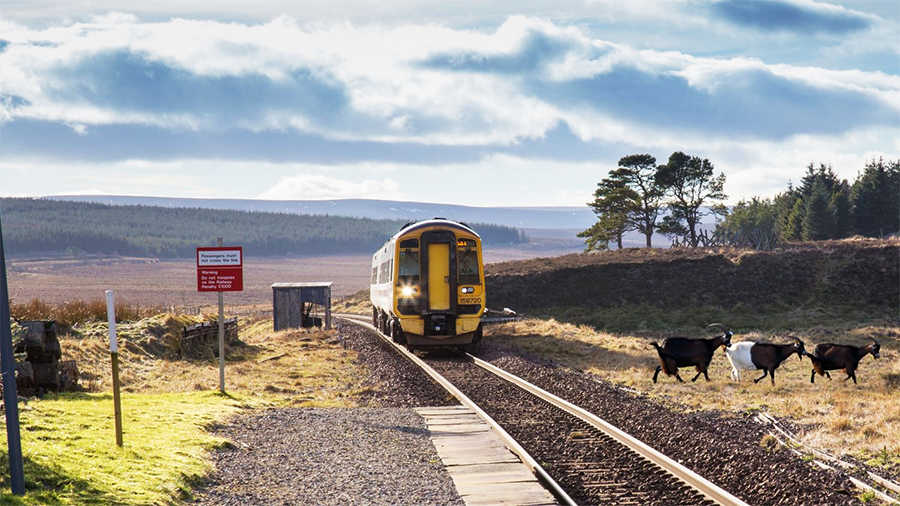The Settle-Carlisle line, a 73-mile trudge across the open fells of Yorkshire and Cumbria, is the most picturesque train in UK. Yet wounded pride was the sole reason it was erected.
Blea Moor is a desolate place. The fells of the Yorkshire Dales National Park billow out in all directions from the gritstone crag at the top of the moor, their sides fern-green and windswept. The isolated moor, which is located in northern England, is not one of the park’s main attractions; aside from the occasional group of tough walkers, it experiences very little activity. The air blows cold up here.
Yet, there is a story to be told 150 meters underground. A tunnel was constructed beneath the moor in the 1870s. It ran for approximately 1.5 kilometers and was as straight as an arrow and as black as a mine. Seven construction shafts had to be driven into the bedrock from above while the task’s crews clawed their way through the soil using handpicks and explosives over the course of four years.
Current situation Train in UK
Today, the same laboriously acquired underpass is being used by my train, a little three-carriage trundler with a cheerful ticket inspector. The Blea Moor Tunnel forms a vital portion of the 73-mile Settle-Carlisle Railway Line, which opened for passenger services in May 1876. The line is one of the most remarkable lengths of rail track in the UK, in part because of the stunningly desolate landscape it travels through, in part because of the close calls it faced in the 1960s and 1980s, and in part because of the fact that it was ever constructed at all.
But I’m moving right now. Riding the train is like to watching one of those eye-tracking, immersive movie displays. Mountains rise up on each side of the route before descending once again to expose wide valleys covered in sunlight and studded with far-off hamlets. There are about 14 tunnels and 21 viaducts that indicate the track’s passage through the untamed hills as it spans swampy plateaus and curves down tussocky slopes. Together with cans of regionally made beer, the aisle cart on board offers branded Settle-Carlisle bookmarks and keychains. This is hardly a typical element of the national rail system, but then again, building the line was no ordinary achievement.
“Your first instinct is that (the terrain) is impassable even to the most competent and daring engineer,” wrote an editorial in the Sheffield Daily Telegraph newspaper a week before the line’s public debut. The large Pennine Chain, as well as the rocky slopes of Ingleborough, Wild Boar, Whernside, and Shap Fells, are not conducive to the building of a railroad.
The 6,000 or so men who were engaged to build the railway, at least 72 of whom perished in work camps that were not adequately sanitized due to smallpox epidemics or accidents, would undoubtedly have agreed.
The train in UK has its main route stretching from the Yorkshire market town of Settle to the Cumbrian city of Carlisle, which is located close to the Scottish border, travels roughly on a south-north axis and is nearly exclusively rural.
The Midland Railway Company sought a piece of the lucrative cross-border rail commerce to and from Scotland in the 1860s. The existing north-south lines, which crossed the Pennine Mountains on each side, were operated by competing businesses that rejected Midland’s offers of cooperation. Midland only had one choice after having its dignity dented: construct a railroad through the hills.
In 1865, the business requested authorization from Parliament to move through with the project, and it was granted. But, in an unexpected turn of events, Midland had also been successful in negotiating an agreement to share one of its rivals’ lines. Yet the government insisted that the firm stay in the original agreement for reasons that we should be thankful for today, so Midland was virtually forced to start the extremely expensive process of constructing more than 70 miles of track across the area’s dipping, rearing curves.

Building a railway train like this would be a huge task even with contemporary technology.
The line skirts the base of Cross Fell, the highest peak in the entire Pennine range, and travels through some of England’s loftiest hill terrain, according to outdoor writer Vivienne Crow, whose Eden Valley walking guidebook uses the line for several of its walks. “Since the railroad is integrated into the environment, passengers are engaged in the view rather than merely gazing out at it from a distance. It’s difficult to understand the expertise, work, and creativity that must have gone into establishing a railway train like this in the 19th Century since even with contemporary technology, it would be a major project.”
Maybe surprisingly, no short cuts were made. The project took longer than anticipated and cost far more than expected, but the Dales railroad that emerged was resilient and long-lasting. Throughout its length, tidy small stations with pitched roofs and new painting began to develop, notably Dent, which at 350m above sea level was and still is England’s highest halt. Furthermore, elements like the eye-catching Ribblehead Viaduct, a 24-arch behemoth that rivals Scotland’s fame-hogging Glenfinnan Viaduct for sheer architectural audacity, made the entire thing into a spectacle as much as a service line.
Even with modern technology, building a railway like this would be a massive undertaking
According to Drew Haley, the former general manager of the Settle-Carlisle Railway Development Corporation, a community partnership devoted to the line, “They produced something wonderful. It was the last mainline railway in England to be almost totally constructed by hand.”
Both the line and the environment fit this description all year round. Once, I rode the train on a day covered in snow, when the peaks loomed gloomy and the stations sped by like pictures from a Christmas card. On this July day, however, the sights are brilliant on the slopes and lush in the valleys. Throughout the 100 minutes it takes to travel from beginning to end, the scenery seldom changes.

Yet a century after it was constructed, the railroad was having financial problems. Nearly all of the stops along the route were closed as a result of the infamous Beeching cuts of the 1960s, an effort by Richard Beeching, the chair of the now-defunct British Rail, to simplify the rail network by closing hundreds of stations. By the 1980s, British Rail recommended permanently putting the Settle-Carlisle line on hold since there were so few freight and passenger trains using the route and part of the infrastructure was deteriorating. The locals didn’t think highly of this.
My first recollections of the line date back to my childhood in Yorkshire and the 1980s closure discussion, according to Haley. “The fight to preserve this illustrious historical railway, which had been built over the treacherous North Pennines and cost so many lives, used to be shown on television. Because so many people cared about it, it grew into a huge campaign.”
What was done?
A petition with tens of thousands of signatures was then delivered to Parliament (as well as the pawprint of a local dog named Ruswarp, now immortalised with a bronze statue on the platform at Garsdale Station, midway along the line). The weight of support was enough that, in 1989, the Settle-Carlisle was granted a reprieve by the government. Amenities were renovated; stations were spruced up and restored to their former grandeur; passenger numbers grew. Since then, the line has hardly turned around.
Nowadays, travelling along it offers more than simply a chance to take in the rolling fells. Passenger services that are scheduled to run continue to travel the whole original route’s bridges, viaducts, and tunnels seven times each day in each direction. Even the protracted blackout that occurs when travelling through Blea Moor Tunnel provides an opportunity to consider the labour and sacrifice of more than 150 years ago. When will you arrive in Carlisle? Your best chance is to have a drink at the appropriately called 301 Miles From London platform pub, take a stroll, and then do the only thing left that makes sense: board the train for the return trip.
It symbolizes adversity and tenacity, said Haley. “For this line, lives were sacrificed. Should it have ever been constructed? Very likely not. We have had to struggle to maintain it because it was, though. It represents a certain aspect of the human spirit.”
Connect with us
https://www.youtube.com/themonktravel
https://www.facebook.com/TheMonk/




























